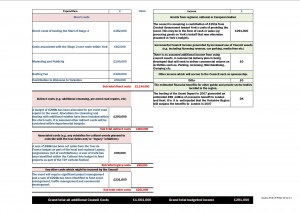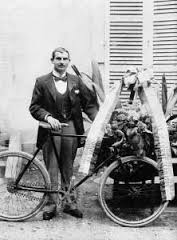It is scarcely 6 months before the second stage of the Tour de France cycle race is due to set off from York.
However, the Council still hasn’t identified how it will maximise income from the event.
The Council has budgeted to spend £1.66 million hosting the event which is taking place on 6th July.
Most will go on crowd control on the day although the organisers have also demanded a £480,000 “hosting fee”
£200,000 will go on road repairs and cleansing, while marketing and publicity will cost £100,000 and “legacy events” £99,000.
However the Council has so far only identified a government grant of £291,000 to offset the costs.
No local sponsorship deals have been identified although it looks like tourism businesses will be the main gainers from the event. There is talk of £88 million being generated for businesses in the region.
The additional income that could be generated from car parking, merchandising, camping etc have also not been identified although £221,000 is being spent on a “project management team”.
The absence of an agreed business plan and any criteria, on which the success or otherwise of the event can be judged, is a major concern.
In response to a Freedom of Information request the Council says,
“In order to maximise value for money and benefit from appropriate economies of scale an economic impact study will be commissioned (through Leeds City Council) on behalf of all LA districts through which the tour will run. This will cover all three stages including the Cambridge to London stage and will be undertaken in conjunction with partners including all relevant LAs (inc. Cambridge, Essex, and London), Sport England, and Transport for London. The study is expected to provide impact information at a LA level (i.e. we should be able to get specific figures for York).
The detail in terms of the methodology and therefore the assessment criteria and performance indicators associated with the work are currently being developed and therefore we are not in a position to provide these at this time.
It is probable that these will be based on a standard methodology developed by Sport England which typically measures impact based on an assessment of additional visitor spend as determined through on the ground survey work. We are also discussing business survey and/or longitudinal study to measure any catalytic impact on business growth and have an ambition to include aspects of the cycling legacy work being undertaken, as well as some of the more qualitative impacts”.
Many residents would no doubt take the view that the objectives of the project should have been clear long before the Council committed £1.66 million of its scarce resources to underpinning the event.
Bizarrely it seems that some Labour Councillors are unaware of the financial risks of the project.
At the last Council meeting one (Cllr Burton) successfully proposed. “that all income generated for City of York Council from the Tour de France Grand Départ is spent on frontline services for residents”
Officials have now confirmed that there is likely to be little or no income from the event which could provide a boost for Council coffers.
The Council taxpayer is likely to be over £1 million out of pocket, with front line public services being the ones to suffer when further budget reductions then become inevitable.
As previously reported, even the less than parsimonious Sheffield Council – where stage 2 finishes on 6th July – is spending much less than York on the Tour.


